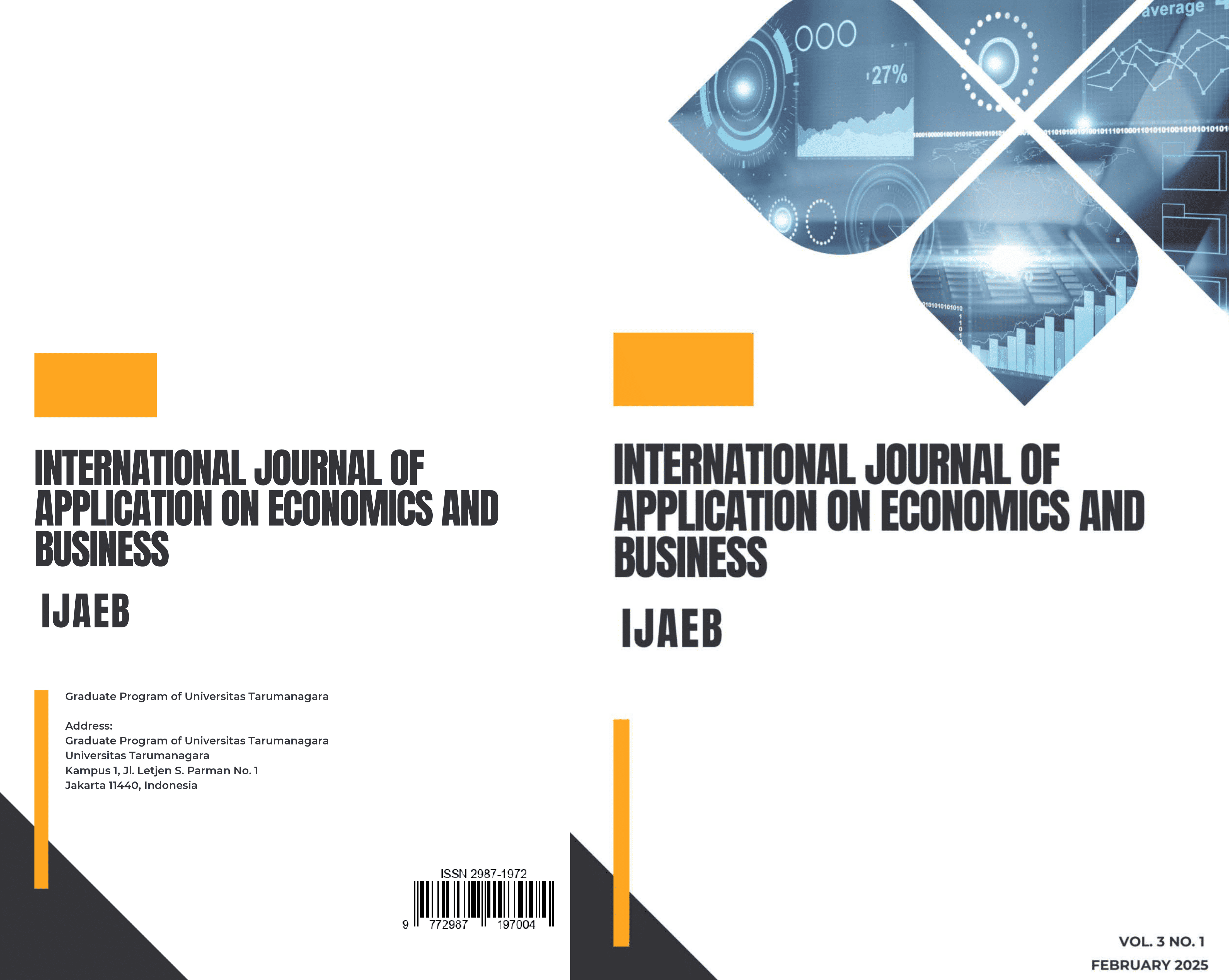SAVING BEHAVIOR OF THE MILLENNIAL GENERATION IN JAKARTA
Main Article Content
Abstract
Indonesian people's interest in saving has decreased to only 15.4% as of May 2024. Bank Indonesia invites the public, especially the millennial generation, to get into the habit of saving. This study aims to determine the effect of peer influence, socialization of parents and self-control on saving behavior. The number of samples in this study was 240 people from the millennial generation who already have income in Jakarta. This study used Structural Equation Modelling (SEM) for data analysis. The results of this study show that peer influence, socialization of parents and self-control have a positive effect on saving behavior.
Article Details
Section

This work is licensed under a Creative Commons Attribution-NonCommercial-ShareAlike 4.0 International License.
This journal provides immediate open access to its content on the principle that making research freely available to the public supports a greater global exchange of knowledge.
IJAEB by Graduate Program of Universitas Tarumanagara is licensed under a Creative Commons Attribution-NonCommercial-ShareAlike 4.0 International License.. Permissions beyond the scope of this license may be available at https://journal.untar.ac.id/index.php/ijaeb
References
Amilia, S., Bulan, T. P. L., & Rizal, M. (2018). Pengaruh melek finansial, sosialisasi orang tua, dan teman sebaya terhadap perilaku menabung mahasiswa Bidik Misi Fakultas Ekonomi Universitas Samudra. Jurnal Samudra Ekonomika, 2(2), 97-107. https://doi.org/10.1234/jse.v2i2.877
Ardiana, M. (2016). Kontrol diri, pendidikan pengelolaan keuangan keluarga, pengetahuan inklusi keuangan siswa pengaruhnya terhadap perilaku menabung siswa SMK se kota Kediri. Jurnal Ekonomi Pendidikan dan Kewirausahaan, 4(1), 59-75. https://doi.org/10.26740/jepk.v4n1.p59-75
Chalimah, S. N., Martono, S., & Khafid, M. (2019). The saving behavior of public vocational high school students of business and management program in Semarang. Journal of Economic Education, 8(1), 22-29. DOI 10.15294/JEEC.V8I1.29741
Dangol, J., & Maharjan, S. (2018). Parental and peer influence on the saving behavior of the youth. The International Research Journal of Management Science, 3(1), 42-63. https://doi.org/10.3126/irjms.v3i0.28035
Gerhard, P., Gladstone, J. J., & Hoffmann, A. O. I. (2018). Psychological characteristics and household savings behavior: The importance of accounting for latent heterogeneity. Journal of Economic Behavior and Organization, 148, 66-82. https://doi.org/10.1016/j.jebo.2018.02.013
Hajar, M. F. F., & Isbanah, Y. (2023). Pengaruh literasi keuangan, inklusi keuangan, kontrol diri, dan teman sebaya terhadap perilaku menabung penggemar K-pop. Jurnal Ilmu Manajemen, 11(2), 482-494. https://doi.org/10.26740/jim.v11n2.p482-494
Jamal, A. A. A., Ramlan, W. K., Karim, M. R. A., Mohidin, R., & Osman, Z. (2015). The effects of social influence and financial literacy on savings behavior: A study on students of higher learning institutions in Kota Kinabalu, Sabah. International Journal of Business and Social Science, 6(11), 110-119.
Kadir, J. M. A., Shoukat, A., Naghavi, N., & Jamaluddin, A. A. (2021). Saving behavior in emerging country: The role of financial knowledge, peer influence and parent socialization. Pakistan Business Review, 22(4), 629-644.
Kamarudin, Z. & Hashim, J. H. (2018). Factors affecting the saving behaviour of Taj International College students. Al Qimah Al Mudhafah The Journal of Management and Science, 4(1), 1-15.
Kenny, K. (2020). Faktor-faktor yang mempengaruhi perilaku menabung pada mahasiswa di kota Batam. Conference on Business, Social Sciences and Innovation Technology, 1(1), 10-22.
Khatun, M. (2018). Effect of financial literacy and parental socialization on students savings behavior of Bangladesh. International Journal of Scientific and Research Publications, 8(12), 296-305. https://dx.doi.org/10.29322/IJSRP.8.12.2018.P8440
Ling, H. (2021). Determinants of saving behaviour among universities students in Guangdong province. The Frontiers of Society, Science and Technology, 3(5), 51-70. DOI: 10.25236/FSST.2021.030510
Mahendra, B. (2024, May 30). Ketertarikan menabung Gen Milenial dan Gen Z rendah di Indonesia. Republik Merdeka.
Mardiana, V., & Rochmawati. (2020). Self-control sebagai moderasi antara pengetahuan keuangan, financial attitude, dan uang saku terhadap perilaku menabung. Jurnal Pendidikan Ilmu Sosial, 30(2), 83-98. DOI: 10.23917/jpis.v30i2.11872
Melvianda, U. & Rahmi, E. (2023). Pengaruh bimbingan orang tua dan self control terhadap perilaku menabung. Jurnal Ecogen, 6(4), 576-586. DOI: 10.24036/jmpe.v6i4.15409
OCBC NISP. (2023). OCBC NISP Financial Fitness Index 2023. OCBC NISP. https://www.ocbc.id/asset/media/Feature/PDF/adhoc/2023/08/21/ocbc-nisp-financial-fitness-index-2023.pdf
Petpairote, W. (2023). Financial skill and self-control affecting the saving behaviour of income earners in Thai municipalities. International Journal of Innovative Research and Scientific Studies, 6(1), 64-71. DOI:10.53894/ijirss.v6i1.1089
Pratama, G. (2023, October 17). Lebih dari 60 persen milenial tak punya dana darurat, ternyata ini penyebabnya. Infobanknews.com.
Respati, A. R. & Ika, A. (2024, March 15). Tingginya biaya hidup halangi anak muda menabung untuk masa pensiun. Kompas.com.
Setiawan, S. R. D. (2023, November 20). 7 kesalahan keuangan milenial yang tidak boleh dilakukan Gen Z. Kompas.com.
Sirine, H., & Utami, D. S. (2016). Faktor-faktor yang memengaruhi perilaku menabung di kalangan mahasiswa. Jurnal Ekonomi dan Bisnis, 19(1), 27-52. https://doi.org/10.24914/jeb.v19i1.479
Tyas, A. R., & Rahmawati, I. Y. (2021). Faktor-faktor yang memengaruhi perilaku menabung di kalangan mahasiswa (Studi pada mahasiswa Fakultas Ekonomi dan Bisnis di Universitas Muhammadiyah Purwokerto, Universitas Jendral Soedirman dan Universitas Wijaya Kusuma). Master Jurnal Manajemen dan Bisnis Terapan, 1(1), 11-22. DOI:10.30595/jmbt.v1i1.10402
Yulianti, W. R. (2023). Pengaruh literasi keuangan dan sosialisasi orang tua terhadap minat menabung di bank pada mahasiswa Prodi Manajemen, Universitas Bina Sarana Informatika. Jurnal Penelitian Manajemen dan Inovasi Riset, 1(4), 82-101. https://doi.org/10.61132/lokawati.v1i4.128
Zulaika, M. D. S., & Listiadi, A. (2020). Literasi keuangan, uang saku, kontrol diri, dan teman sebaya terhadap perilaku menabung mahasiswa. Ekuitas: Jurnal Pendidikan Ekonomi, 8(2), 137-146. https://doi.org/10.23887/ekuitas.v8i2.26768

